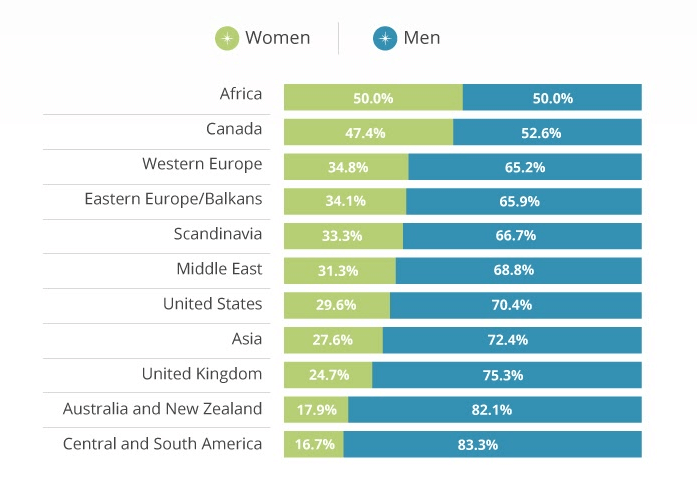More than 70% of SEOs in the U.S. are men, make more than female colleagues
Men were also charging nearly 67% more than women for project work.
There is still considerable gender inequality in SEO. In 2015, female SEOs represented about 30% of the industry, according to a survey from Moz. That percentage hasn’t budged in five years, according to a new global survey of 652 SEOs from Nicole DeLeon’s North Star Inbound.
Men represented 68.4% of survey respondents, while women were 29.3%. A small percentage declined to state or identified as non-binary.
U.S. slightly worse than average. Broken down by geography, the U.S. numbers were somewhat more skewed than the overall sample. Male SEOs comprised 70% of respondents. However there were even greater male-to-female ratios in Asia, the U.K., Australia and Central and South America.
One thing to keep in mind: the sample of 652 respondents means that when it’s segmented by geography, the numbers may become too small to be representative. But, the data is consistent with other, previous surveys.
Geography and SEO gender diversity

The pay gap remains. A recent BrightLocal survey about people working in local SEO specifically found a pay gap of roughly 14% between men and women. Men were also more likely to occupy senior roles in agencies.
The North Star Inbound survey found that across the board women were making and charging less than their male counterparts, whether in agencies or as freelancers. For SEOs who use retainers, “those identifying as male charge a median retainer of $2,250 a month while those identifying as female charge a median of $1,750.”
Among those billing on a project basis, men were charging nearly 67% more. Male freelancers reported “a median of $5,000 vs. $3,000 for female-identifying SEOs.” The disparity was even greater for agencies charging by project: $8,750 per project for men, $2,250 for women.
In-house, technical SEO and freelancers. Findings from in-house SEOs in the North Star Inbound survey were somewhat encouraging. Women and men equally “reported strong levels of interdepartmental cooperation and support for SEO priorities.” And, women appear to be slightly more satisfied than men with in-house support, staffing, budget and tools.
But in technical SEO, there’s a significant gap between men and women. Roughly 22% male respondents identified themselves as technical SEO experts compared to just under 13% of women.
Finally, women were more likely than men to be SEO freelancers: 17.7% for women vs. 10.6% of men. The survey hypothesizes this is due to the greater need for flexible scheduling among women. “Part of the appeal may be flexibility around childcare, but control over income was also a factor for some of the SEOs we interviewed,” North Star Inbound explained.
Why we care. Organizations that feature greater diversity in their leadership teams are more likely to be innovative with corresponding revenue growth. Indeed, diversity is good for the bottom line. But, overcoming institutional bias and gender discrimination is an ingrained and even structural problem that will take concerted effort over a period of years to overcome.
While there are some areas to be optimistic about in the survey data — and despite some very successful, high profile female SEOs in the industry — there has been only limited progress in the past five years. Clearly, we need to do much more in the way of training, mentoring and cultural change.
RELATED:
Opinions expressed in this article are those of the guest author and not necessarily Search Engine Land. Staff authors are listed here.
Related stories